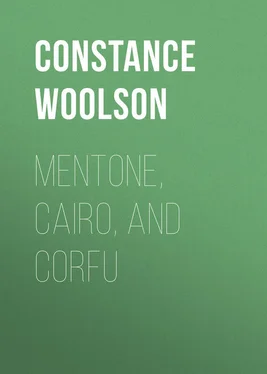Constance Woolson - Mentone, Cairo, and Corfu
Здесь есть возможность читать онлайн «Constance Woolson - Mentone, Cairo, and Corfu» — ознакомительный отрывок электронной книги совершенно бесплатно, а после прочтения отрывка купить полную версию. В некоторых случаях можно слушать аудио, скачать через торрент в формате fb2 и присутствует краткое содержание. ISBN: , Жанр: foreign_prose, на английском языке. Описание произведения, (предисловие) а так же отзывы посетителей доступны на портале библиотеки ЛибКат.
- Название:Mentone, Cairo, and Corfu
- Автор:
- Жанр:
- Год:неизвестен
- ISBN:http://www.gutenberg.org/ebooks/33367
- Рейтинг книги:4 / 5. Голосов: 1
-
Избранное:Добавить в избранное
- Отзывы:
-
Ваша оценка:
- 80
- 1
- 2
- 3
- 4
- 5
Mentone, Cairo, and Corfu: краткое содержание, описание и аннотация
Предлагаем к чтению аннотацию, описание, краткое содержание или предисловие (зависит от того, что написал сам автор книги «Mentone, Cairo, and Corfu»). Если вы не нашли необходимую информацию о книге — напишите в комментариях, мы постараемся отыскать её.
Mentone, Cairo, and Corfu — читать онлайн ознакомительный отрывок
Ниже представлен текст книги, разбитый по страницам. Система сохранения места последней прочитанной страницы, позволяет с удобством читать онлайн бесплатно книгу «Mentone, Cairo, and Corfu», без необходимости каждый раз заново искать на чём Вы остановились. Поставьте закладку, и сможете в любой момент перейти на страницу, на которой закончили чтение.
Интервал:
Закладка:
"I wonder how many girls have thrown themselves off that rock?" said Janet, gazing at an isolated peak, shaped like a sugar-loaf, which stood alone within the ravine.
"What a holocaust you imagine, Miss Trescott!" said Verney. "How could they climb up there, to begin with?"
"I do not know. But they always do. I have never known a rock of that kind which has succeeded in evading them," answered Janet. "They generally call them 'Lovers' Leaps.'"
After a while we went on "to Italy," passing the square Italian custom-house perched on its cliff, and following the road by the little Garibaldi inn, and on towards the point of Mortola.
"This is the Italian frontier," said Verney. "In old times, during the Prince's reign, no one could leave the domain without buying a passport; any one, therefore, who wished to take an afternoon walk was obliged to have one. But things are altered now in Menton."
"Are we to call the place Menton or Mentone?" asked Janet. "We might as well come to some decision."
"Menton is correct," said the Professor; "it is now a French town."
"Oh no! let us keep to the dear old names, and say Men-to-ne," said Mrs. Clary.
" I have even heard it pronounced to rhyme with bone," said Verney, smiling. Inness and Baker now looked at each other, and fell behind, but after a few minutes they came forward again, and, advancing to the front, faced us, and delivered the following epic:
Inness:
"What shall we call thee? Shall we give our own
Plain English vowels to thee, fair Mentone?"
Baker:
"Or shall we yield thee back thy patrimony,
The lost Italian sweetness of Mentone?"
Inness:
"Or, with French accent, and the n's half gone,
Try the Parisian syllables – Men-ton?"
We all applauded their impromptu. The Professor, seeing that poetry held the field, walked apart musingly. I think he was trying to recall, but without success, an appropriate Latin quotation.
The view from the point above Mortola is very beautiful. On the west, Mentone with its three spires, the green of Cap Martin; and beyond, the bold dark forehead of the Dog's Head rising above Monaco.
"Do you see that blue line of coast?" said Verney. "That is the island where lived the Man with the Iron Mask."
"Bazaine was confined there also," said the Professor.
But none of us cared for Bazaine. We began to talk about the Mask, and then diverged to Kaspar Hauser, finally ending with Eleazer Williams, of "Have we a Bourbon among us?" who had to be explained to the Englishmen. It was some time before we came back to the view; but all the while there it was before us, and we were unconsciously enjoying it. On the east was, first, the little village of Mortola at our feet; then fortified Ventimiglia; and beyond, Bordighera, gleaming whitely on its low point out in the blue sea.
"Blanche Bordighera," said Mrs. Clary; "it is to me like paradise – always silvery and fair. No matter where you go, there it is; whether you look from Cap Martin or St. Agnese, from Ciotti or Roccabruna, you can always see Bordighera shining in the sunlight. Even when there is a mist, so that Mentone itself is veiled and Ventimiglia lost, Bordighera can be seen gleaming whitely through. And finally you end by not wanting to go there; you dread spoiling the vision by a less fair reality, and you go away, leaving it unvisited, but carrying with you the remembrance of its shining and its feathery palms."
"Is it palmy?" asked Janet.
"There are probably now more palms at Bordighera than in the Holy Land itself," said Verney, who had wound himself into a place beside her. I say "wound," because Verney was so long and lithe that he could slip gracefully into places which other men could not obtain. Lloyd was not with us. He had not left his post of duty beside the phaeton, which was coming slowly up the hill behind us; but I noticed that he had selected Margaret's side of it.
"Palms would grow at Mentone, or at any other sheltered spot on this coast," said the Professor, at last abandoning the obstinate quotation, and coming back to the present. "But the cultivation is not remunerative save at Bordighera, where they own the monopoly of supplying the palm branches used on Palm-Sunday at Rome."
"Excuse me," said Inness; "but I think you did not mention the origin of that monopoly?"
"A monkish legend," said the Professor, contemptuously.
"In those days everything was monkish," replied Inness; "architecture, knowledge, and religion. If we had lived then, no doubt we should all have been monks."
"Ah, yes!" said Miss Elaine, fervently. "Do tell us the legend, Mr. Inness. I adore legends, especially if ecclesiastical."
"Well," said Inness, "a good while ago – in 1586 – the Pope decided to raise and place upon a pedestal an Egyptian obelisk, which, transported to Rome by Caligula, had been left lying neglected upon the ground. An apparatus was constructed to lift the huge block, and with the aid of one hundred and fifty horses and nine hundred men it was raised, poised, and then let down slowly towards its position, amid the breathless silence of a multitude, when suddenly it was seen that the ropes on one side failed to bring it into place. All, including the engineer in charge, stood stupefied with alarm, when a voice from the crowd called out, 'Wet the ropes!' It was done; the ropes shortened; the obelisk reached its place in safety. The Pope sent for the man whose timely advice had saved the lives of many, and asked him what reward would please him most. He was a simple countryman, and with much timidity he answered that he lived at Bordighera, and that if the palms of Bordighera could be used in Rome on Holy Palm-Sunday he should die happy. His wish was granted," concluded Inness, "and – he died."
"I hope not immediately," I said, laughing.
On our way back, Verney showed us a path leading up the cliff. "Let me give you a glimpse of a lovely garden," he said. We looked up, and there it was on the cliff above us, like the hanging gardens of Babylon, green terraces clothing the bare gray rock with beautiful verdure. Margaret left the phaeton and went up the winding path with us, Mrs. Trescott and Mrs. Clary remaining below. The gate of the garden, which bore the inscription "Salvete Amici," opened upon a long columned walk; from pillar to pillar over our heads ran climbing vines, and on each side were ranks of rare and curious plants, the lovely wild flowers of the country having their place also among the costlier blossoms. "Before you go farther turn and look at the tower," said Verney. "It has been made habitable within, but otherwise it is unchanged. It was built either as a lookout in which to keep watch for the Saracens, or else by the Saracens themselves when they held the coast."
"By the Sarrasins themselves, of course – always with two r's," said Janet. "Think of it – a Sarrasin tower! I would rather own it than anything else in the whole world."
Whereupon Verney, Inness, the Professor, Lloyd, and Baker all wished to know what she would do with it.
"Do with it?" repeated Janet. "Live in it, of course. I have always had the greatest desire to live in a tower; even light-houses tempt me."
"I shall tell Dr. Bennet," said Verney, laughing. "This is his garden, you know."
At the end of the columned walk we went around a curve by a smaller tower, and descended to a lower path bordered with miniature groves of hyacinth, whose dense sweetness, mingled with that of heliotrope, filled the air. Here Margaret seated herself to enjoy the fragrance and sunshine, while we went onward, coming to a magnificent array of primulas, rank upon rank, in every shade of delicate and gorgeous coloring, a pomp of tints against a background of ferns. Below was a little vine-covered terrace with thick, soft, English grass for its velvet flooring; here was another paradisiacal little seat, like the one where we had left Margaret, overlooking the blue sea. On terraces above were camellias, roses, and numberless other blossoms, mingled with tropical plants and curious growths of cacti; behind was a lemon grove rising a little higher; then the background of gray rocks from which all this beauty had been won inch by inch; then the great peaks of the mountain amphitheatre against the sky – in all, beauty enough for a thousand gardens here concentrated in one enchanting spot.
Читать дальшеИнтервал:
Закладка:
Похожие книги на «Mentone, Cairo, and Corfu»
Представляем Вашему вниманию похожие книги на «Mentone, Cairo, and Corfu» списком для выбора. Мы отобрали схожую по названию и смыслу литературу в надежде предоставить читателям больше вариантов отыскать новые, интересные, ещё непрочитанные произведения.
Обсуждение, отзывы о книге «Mentone, Cairo, and Corfu» и просто собственные мнения читателей. Оставьте ваши комментарии, напишите, что Вы думаете о произведении, его смысле или главных героях. Укажите что конкретно понравилось, а что нет, и почему Вы так считаете.












